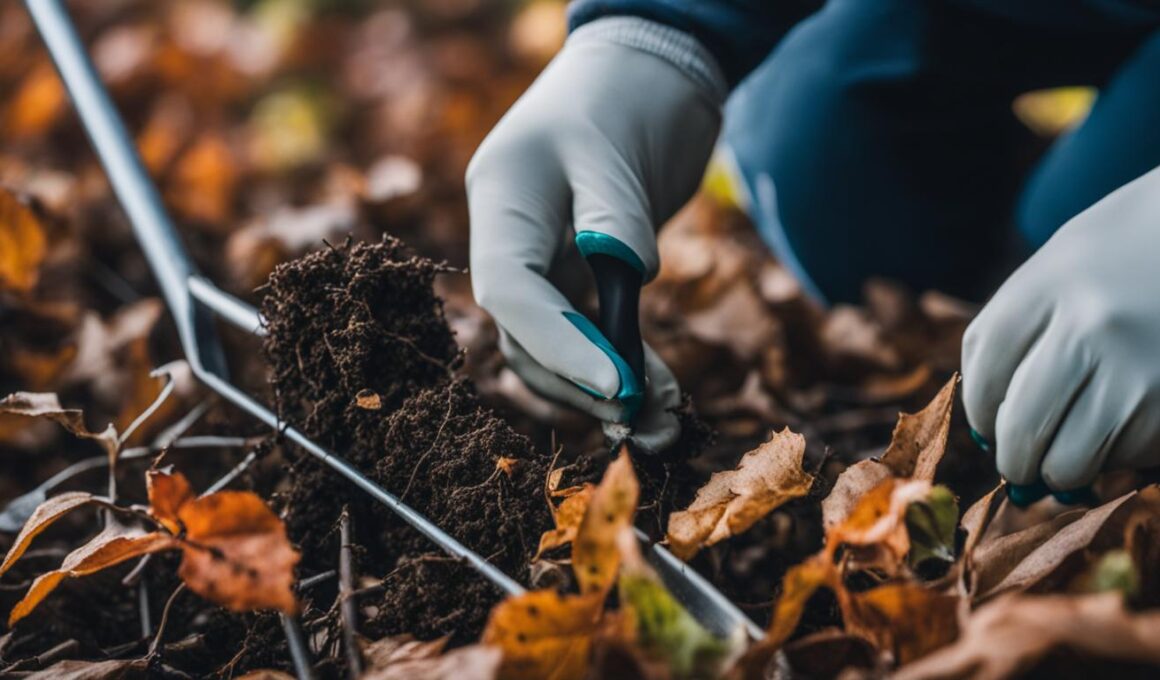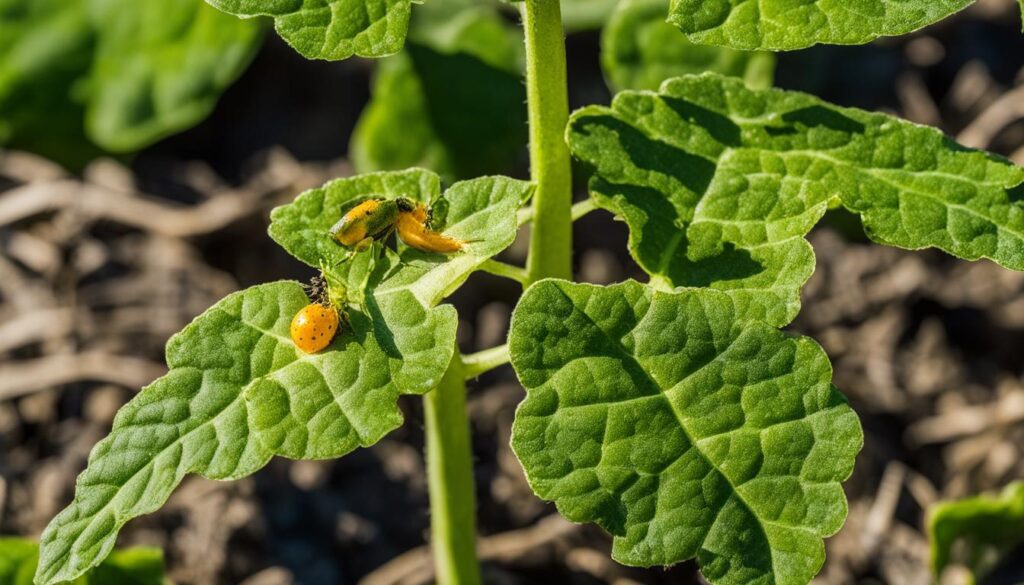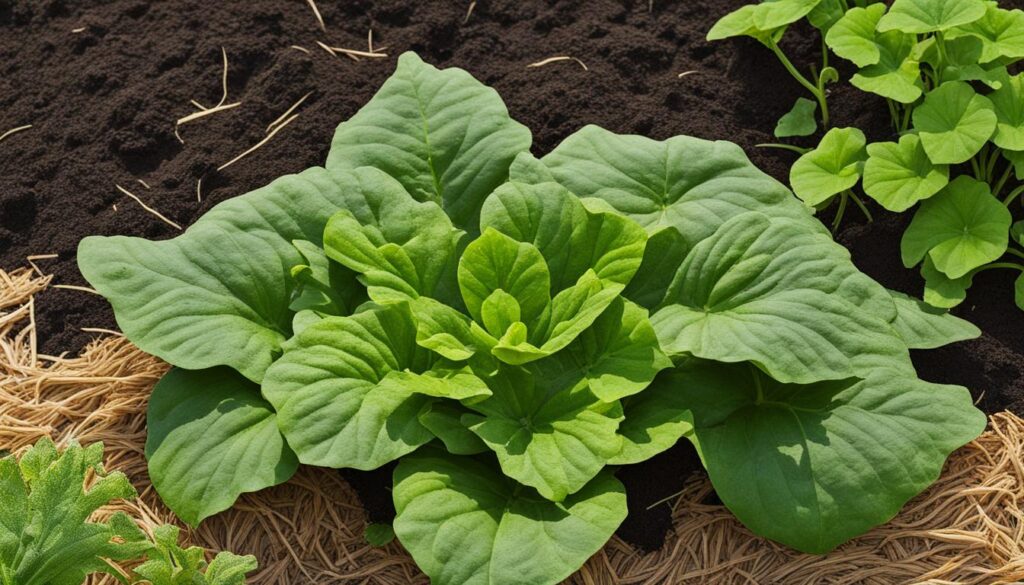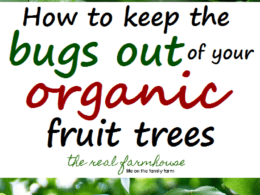Squash vine borers are destructive pests that can wreak havoc on your squash plants during the summer growing season. If left unchecked, they can cause your plants to wilt and die, resulting in a disappointing harvest. But fear not! In this section, we will delve into effective methods to kill vine borers and prevent infestations using organic techniques.
Key Takeaways:
- Killing vine borers is crucial for protecting your squash plants from infestations.
- Preventing vine borer infestation is possible through organic methods.
- Organic techniques include the use of Bt spray, mulching, and physical barriers.
- Surgical removal and crop rotation are additional control measures that can be employed.
- By implementing these organic methods, you can protect your squash plants from vine borers and promote healthy growth.
Identifying and Understanding Squash Vine Borers
Squash vine borers are the larvae of an orange and black moth that resembles a wasp. They lay their eggs on squash plants, and once the eggs hatch, the larvae bore into the stems and feed on the plant’s tissue. The main sign of a squash vine borer infestation is wilting of the plant, usually accompanied by small holes in the stems and sawdust-like frass.
Understanding the life cycle of squash vine borers is crucial for effective control. The adult moths emerge in late spring to early summer and lay their eggs on the stems of squash plants. After the eggs hatch, the larvae tunnel into the stems, where they feed and grow. The larvae overwinter in the stems and pupate in early spring, completing the life cycle.
“The main sign of a squash vine borer infestation is wilting of the plant, usually accompanied by small holes in the stems and sawdust-like frass.”
To identify squash vine borers, look for the distinctive adult moth hovering around squash plants during the day. The female moth will lay eggs near the base of the plant. Once the larvae are inside the plant, it becomes difficult to spot them. However, the presence of wilting plants and small holes in the stems can be indicative of an infestation. Monitoring your squash plants regularly and being vigilant for these signs can help you take swift action to control vine borers.
Signs of Squash Vine Borer Infestation
The most common signs of a squash vine borer infestation include:
- Plant wilting, especially during the heat of the day.
- Small holes in the stems near the base of the plant.
- Sawdust-like frass near the entrance holes.
- Dark “sappy” substance oozing from the stems.
If you notice any of these signs, it is important to take immediate action to prevent further damage to your squash plants.
Organic Methods to Kill Vine Borers
If you’re dealing with a vine borer infestation in your squash plants, don’t worry – there are effective organic methods to help you combat these destructive pests. One popular solution is using Bt spray, which stands for Bacillus thuringiensis, a naturally occurring bacterium. Bt spray specifically targets the larvae of squash vine borers, making it an excellent choice for controlling their population. To use Bt spray, simply apply it to the leaves, stems, and main stem of your squash plants. This method is safe for the environment and poses no harm to beneficial insects.
Mulching is another organic approach to prevent vine borer infestation. By mulching the stems of your squash plants, you create a barrier that can deter adult moths from laying their eggs. Use organic materials such as straw or wood chips, and make sure to apply a generous layer around the base of each plant. Mulching not only helps to prevent infestation but also helps retain moisture in the soil, promotes healthy plant growth, and suppresses weed growth.
Physical barriers can also be an effective way to prevent vine borer infestations. Floating row covers made of lightweight fabric can be placed over your squash plants to create a physical barrier that excludes the adult moths. Ensure that the covers are securely anchored to the ground to prevent any gaps where the moths could enter. Additionally, remove the covers when the plants start to flower to allow for pollination by bees or other beneficial insects.
Benefits of Organic Methods
Using organic methods such as Bt spray, mulching, and physical barriers not only helps to kill vine borers and prevent infestations but also promotes a healthier, more sustainable garden. These methods are safe for beneficial insects, such as bees, and minimize harm to the environment. By adopting organic practices, you can protect your squash plants while maintaining the ecological balance in your garden.
- Organic methods are safe for beneficial insects and the environment.
- Bt spray specifically targets squash vine borer larvae.
- Mulching helps retain moisture, promote plant growth, and suppress weeds.
- Physical barriers exclude adult moths from accessing plants.
By incorporating these organic methods into your gardening routine, you can effectively kill vine borers and protect your squash plants without resorting to harmful chemicals. Remember to monitor your plants regularly for any signs of infestation and take immediate action to prevent the spread of vine borers. With a little care and attention, your squash plants can thrive and provide you with a bountiful harvest.
Surgical Removal and Other Control Measures
Squash plants infested with vine borers require immediate intervention to save them from further damage. One method that can be attempted is surgical removal of the vine borer larvae. To do this, carefully cut open the stem of the affected plant and locate the borer. Once found, gently remove it. However, it is important to note that this technique may not always be successful in saving the plant, especially if the infestation is severe.
Crop rotation is another effective measure to prevent vine borer infestation. By planting squash in different areas each season, you disrupt the life cycle of the squash vine borers, making it difficult for them to find and attack your plants. This practice is particularly useful in reducing the likelihood of recurring infestations in your garden.
If infestations persist despite preventive measures, insecticide treatments can be utilized as a last resort. However, it is recommended to opt for organic insecticides that are less harmful to the environment and beneficial insects. When using insecticides, always follow the instructions provided on the label and apply them as directed to ensure safe and effective control of vine borers.
Conclusion
Effective methods to kill vine borers and protect your squash plants from infestations involve organic vine borer control measures. By implementing these techniques, you can ensure the health and vitality of your squash plants without resorting to harmful chemicals.
One of the most successful organic methods for vine borer control is the use of Bt spray. By applying this naturally occurring bacterium to the leaves, stems, and main stem of your squash plants, you can target and kill the vine borer larvae, effectively controlling their population.
Mulching the stems of your squash plants is another effective measure. This technique prevents the adult moths from laying their eggs on the stems and reduces the risk of infestation. Additionally, using physical barriers such as floating row covers can exclude the moths from accessing your plants and laying eggs, further protecting them from vine borers.
In cases where vine borers have already infested your plants, surgical removal of the larvae can be attempted. However, this method may not always be successful in saving the plant. It is also recommended to practice crop rotation, planting squash in different areas each season to disrupt the life cycle of the squash vine borers.
By incorporating these organic methods into your squash plant care routine, you can effectively kill vine borers and safeguard your plants from infestations. This way, you can enjoy healthy squash plants and a thriving garden without compromising the environment or the well-being of beneficial insects.
What are the most effective methods for killing vine borers in the garden?
To effectively combat vine borers in your garden, consider planting resistant varieties, rotating crops, and using floating row covers. Additionally, removing and destroying infected plants and applying beneficial nematodes can help deter these destructive pests. Following these tips for vine borer prevention can safeguard your garden from infestation.
FAQ
How can I identify squash vine borers?
Squash vine borers are the larvae of an orange and black moth that resembles a wasp. They lay their eggs on squash plants, and once the eggs hatch, the larvae bore into the stems and feed on the plant’s tissue. The main sign of a squash vine borer infestation is wilting of the plant, usually accompanied by small holes in the stems and sawdust-like frass.
What are some organic methods to kill vine borers?
One effective method is the use of Bt spray, a naturally occurring bacterium that targets the larvae of squash vine borers. Applying Bt spray to the leaves, stems, and main stem of squash plants can provide control of these pests. Another effective method is to mulch the stems of squash plants, which can prevent the adult moths from laying their eggs. Additionally, using physical barriers such as floating row covers can exclude the moths from accessing the plants and laying eggs.
How can I remove vine borers from infested plants?
In cases where vine borers have already infested the plants, surgical removal of the larvae can be attempted. This involves carefully cutting open the stem, locating the borer, and removing it. However, this method may not always be successful in saving the plant.
What other control measures can I use?
Another preventive measure is crop rotation, which involves planting squash in different areas each season to disrupt the life cycle of the squash vine borers. If necessary, insecticide treatments can also be used for vine borer control, although organic options should be favored to minimize harm to beneficial insects.
How can I effectively kill vine borers and prevent infestations?
By implementing organic methods such as Bt spray, mulching, and the use of physical barriers, you can effectively kill vine borers and prevent infestations. Surgical removal of larvae and crop rotation can also be employed to manage these pests. These methods will help protect your squash plants and promote healthy growth without resorting to harmful chemicals.











